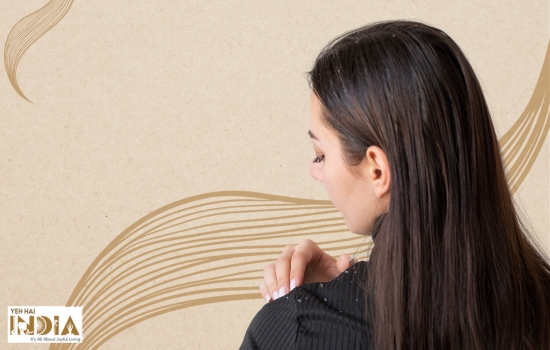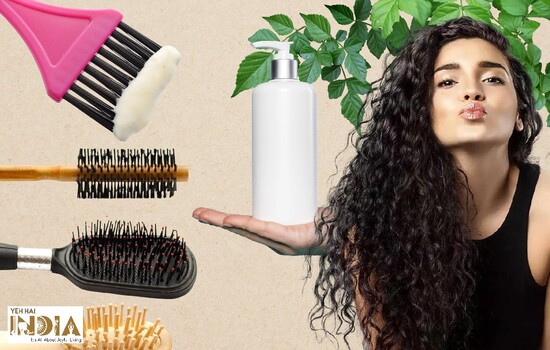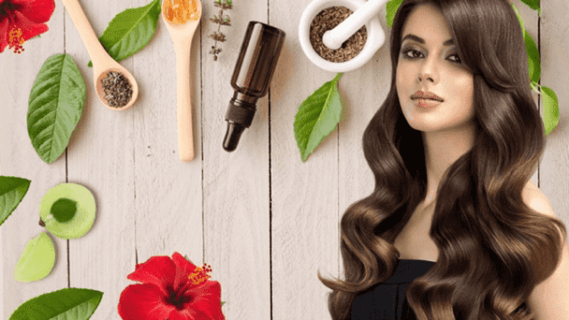Winter can be a beautiful and magical season, but it also brings its fair share of challenges, especially when it comes to maintaining the health and vitality of your hair.
Healthy hair in winter isn’t just about achieving the perfect style; it’s about preventing damage, and breakage, and maintaining the overall well-being of your hair. Harsh cold winds outside can lead to brittle, frizzy, and lacklustre locks, making it essential to adapt your hair care routine for the winter months.
This article will delve into the top winter hair care tips to keep your mane looking its best even when faced with the harshest elements. From selecting the right products to making simple changes in your daily routine, we’ll explore a range of strategies to combat common winter hair woes.
Why do you need special hair care during winter?
During winter, the need for special hair care becomes paramount due to the unique challenges presented by the cold and dry weather. As the temperature drops, the air becomes drier and our hair can suffer the consequences. Several factors contribute to the necessity of adjusting your hair care routine during this season.
First and foremost, the cold air outside significantly reduces the humidity levels. Low humidity robs your hair of its natural moisture, leading to dryness, frizz, and breakage. To combat this, special winter hair care is essential, emphasizing hydration and moisture retention through the use of specific products like moisturizing shampoos and conditioners.
Additionally, the cold weather can cause the hair cuticle to contract, making it more susceptible to damage. Special care helps protect your hair from external elements such as wind, snow, and frost, ensuring it remains healthy and vibrant. Using protective hairstyles and accessories like hats or scarves can shield your hair from these environmental aggressors.
Moreover, indoor heating systems can further exacerbate dryness and static, making it crucial to employ deep conditioning treatments and natural oils to maintain your hair’s health. In summary, specialized care for winter hair is necessary to prevent dryness, breakage, frizz, and other issues that can arise during this season, ensuring your hair stays radiant and resilient throughout the colder months.
We’ll uncover the secrets to nourishing and protecting your hair from the cold, dry conditions, helping you embrace the season with confidence and grace.
Whether you have straight, curly, or textured hair, these winter hair care tips are designed to address the unique needs of your hair type, ensuring that you can flaunt your locks all winter long, and emerge in spring with hair that’s as beautiful and healthy as ever.
Say goodbye to winter hair woes, and say hello to a season of radiant, vibrant tresses.
Recommended Article: How To Make Your Hair Grow Longer, Faster: 15 Proven Hair Growth Tips
Top Winter Hair Care Tips For Healthy Hair

As the cold, dry winter months approach, it’s essential to adapt your hair care routine to prevent damage and maintain healthy, luscious locks. Winter can be particularly harsh on your hair, leading to issues like dryness, breakage, and frizz. To help you keep your hair looking its best during the winter season, we’ve compiled a list of top winter hair care tips that will leave you with strong, shiny, and healthy hair.
1. Hydration is Key
The most crucial factor in winter hair care is maintaining moisture. The dry air and cold temperatures can strip your hair of its natural oils, leaving it dry and brittle. To combat this, use hair oil more frequently than you usually do. Also, use hydrating shampoo and conditioner specifically formulated for winter care. These products will help retain moisture and keep your hair well-nourished.
2. Limit Shampooing
In the winter, avoid over-shampooing your hair as it can further dry it out. Instead, aim to wash your hair every 3-4 days, or even less frequently, if possible. Use a sulfate-free and mild shampoo to prevent excess drying.
3. Lukewarm Water
Opt for lukewarm water when washing your hair. Hot water can strip your hair of its natural oils, making it more brittle and prone to damage. Finish your hair rinse with a blast of cold water to help seal the cuticles and add shine.
4. Deep Conditioning
Incorporate deep conditioning treatments into your weekly routine. Look for hair masks or deep conditioners rich in natural oils and ingredients like argan oil, shea butter, and aloe vera. Apply the product from the mid-length to the tips and leave it on for at least 15-20 minutes for maximum moisture absorption.
5. Oil Massage
Regularly massage your scalp and hair with natural oils like coconut, olive, or argan oil. These oils not only help moisturize your scalp but also nourish your hair from the roots, preventing dryness and breakage. Apply oil before bedtime, cover your head with a warm towel, and wash it out in the morning.
6. Use a Humidifier
Indoor heating systems can suck the moisture out of the air, which can lead to dry hair worsening the effect of the already cold climate. Using a humidifier in your bedroom can help maintain the right level of humidity, preventing your hair from becoming overly dry.
7. Protective Styles
Consider wearing protective hairstyles like braids, buns, or twists to shield your hair from harsh weather conditions. These styles help minimize exposure to the elements, reducing the risk of damage.
8. Trim Your Ends
Regular trims are essential, even during the winter months. Dry, split ends can travel up the hair shaft and lead to more significant damage. Trimming your hair every 6-8 weeks will help maintain healthy ends and prevent breakage.
9. Wear a Hat
When heading out into the cold, wearing a hat or a scarf can protect your hair from wind and cold temperatures. Just ensure that your headwear is made of a material that won’t cause static or further damage to your hair.
10. Limit Heat Styling
Reducing the use of heat-styling tools like flat irons and curling irons can help prevent excess dryness and damage. If you must use them, apply a heat protectant spray and keep the heat setting on the lower side.
11. Eat Healthy
Maintaining a healthy diet is crucial for winter hair care, as what you eat directly impacts the quality of your hair. Nutrient-rich foods provide essential vitamins and minerals that promote hair strength and growth. In winter, when environmental factors can leave your hair dry and brittle, a well-balanced diet including berries, carrots, eggs, leafy greens, meat, etc. supports overall hair health, helping to combat issues like breakage, dryness, and even excessive shedding.
A Comprehensive Daily Hair Care Routine for Winter in India

Winter in India brings its unique set of challenges for maintaining healthy and beautiful hair. The dry and cold weather, combined with pollution and indoor heating, can wreak havoc on your locks. To combat these issues, here’s a comprehensive daily hair care routine tailored to suit Indian conditions during the winter season.
1. Gentle Cleansing
Start your winter hair care routine with a gentle cleansing using a sulfate-free, moisturizing shampoo. Sulfates can be harsh and further strip your hair of its natural oils, so opt for a mild shampoo that helps retain moisture.
Massage your scalp thoroughly to improve blood circulation, but avoid using hot water, as it can lead to dryness. Finish with a cool water rinse to seal the hair cuticles. Do this only once or twice a week in winter to avoid over-shampooing as discussed above.
2. Hydrating Conditioner
Follow up with a hydrating conditioner that suits your hair type. Apply it from the mid-length to the tips and leave it on for a couple of minutes to allow deep moisturization. Rinse with cool water to lock in the moisture.
3. Natural Oils and Serums
After washing your hair, apply a few drops of natural hair oil like coconut, argan, or olive oil to dampen hair. These oils help lock in moisture and protect your hair from dryness and damage. For added shine and protection against environmental pollutants, consider using a hair serum with UV filters.
4. Comb Gently
Use a wide-toothed comb to detangle your hair when it’s still damp. Start from the tips and work your way up to prevent breakage. Be gentle, as wet hair is more susceptible to damage.
5. Drying Techniques
Instead of vigorously rubbing your hair with a towel, gently pat it dry to avoid frizz. If possible, allow your hair to air dry. If you must use a hairdryer, choose the lowest heat setting and keep it at least 6 inches away from your hair. Always use a heat protectant spray before blow-drying.
6. Protective Hairstyles
As previously mentioned, consider wearing protective hairstyles like braids, buns, or twists to shield your hair from the cold and pollution. Additionally, using a silk or satin scrunchie can prevent hair breakage while securing your style.
7. Scalp Care
Give your scalp some love by massaging it once or twice a week with natural oils like coconut or almond oil once a week. This helps maintain a healthy scalp and can prevent dandruff.
8. Stay Hydrated and Eat Nutritiously
A proper diet is vital for hair health. Stay hydrated by drinking plenty of water, and include foods rich in essential nutrients like leafy greens, nuts, and fatty fish in your meals. These nourishing foods provide vitamins and minerals that promote strong, healthy hair.
9. Trim Your Ends
Regular trims, every 6-8 months, are essential, even during the winter months. Dry, split ends can travel up the hair shaft and lead to more significant damage.
10. Sleep on Silk
Swap your cotton pillowcase for a silk or satin one or other microfiber materials. These materials reduce friction and help your hair retain moisture, preventing frizz and breakage.
Remember, consistency is key, so commit to these practices, and you’ll enjoy lustrous, resilient hair, even in the coldest of Indian winters.
To conclude,
Your hair deserves extra love and care during the winter months, and by following these top winter hair care tips, you can ensure that your locks remain healthy, shiny, and beautiful. Winter hair care is all about maintaining moisture, protecting your hair from the harsh elements, and adopting a gentle approach to maintenance.
The cold, dry weather may pose challenges, but with the right hydration, protection, and maintenance, you can counteract the damaging effects of winter and emerge with hair that’s as stunning as ever.
With these top winter hair care tips, you can keep your locks healthy, shiny, and beautiful throughout the colder months. Embrace a consistent routine that focuses on hydration and protection, and your hair will thank you for it.
Remember, winter hair care is all about keeping the cold at bay and embracing the warmth of healthy, vibrant tresses.
Recommended Article: Hair Superfoods and Diet Tips: The Ultimate Guide to Foods for Hair Growth
Frequently Asked Questions
1. How can I prevent static and frizz in my hair during winter?
To combat static and frizz, use a hydrating shampoo and conditioner, avoid overusing heating tools, and incorporate anti-frizz products into your routine. You can also consider using a humidifier in your living space to maintain the right level of humidity.
2. Are there any natural remedies for dry winter hair?
Yes, natural remedies can be highly effective. You can apply coconut oil, olive oil, or argan oil to your hair for deep conditioning. Additionally, a homemade hair mask with ingredients like honey, yoghurt, and avocado can provide moisture and shine.
3. How often should I trim my hair during the winter?
Regular trims are essential year-round, including in winter. Aim to trim your hair every 6-8 weeks to prevent dry, split ends from travelling up the hair shaft and causing more significant damage.
4. What foods should I include in my winter diet to promote healthy hair?
Incorporate foods rich in vitamins and minerals, such as leafy greens, eggs, nuts, and fatty fish. These foods provide essential nutrients like biotin, omega-3 fatty acids, and vitamins that promote hair strength and growth.
5. Can I still use heat styling tools in winter without damaging my hair?
You can use heat styling tools in moderation during winter. To protect your hair, always apply a heat protectant spray and use the lowest effective heat setting. Reducing the frequency of heat styling and using alternative methods like heatless curls can also help minimize damage.










